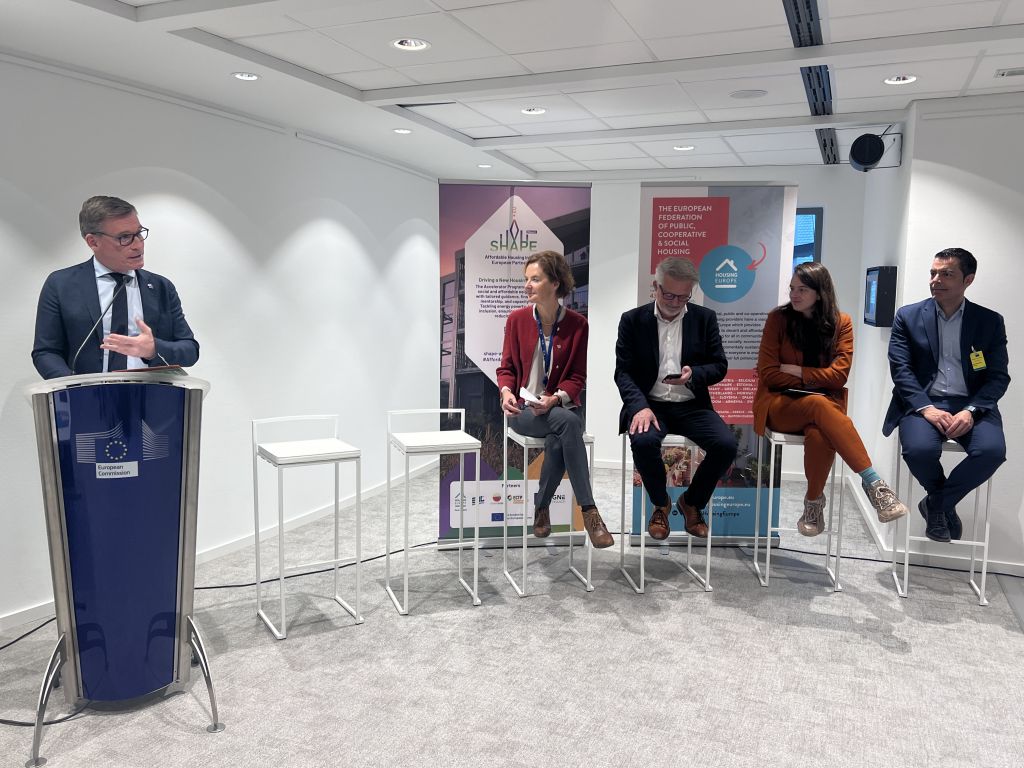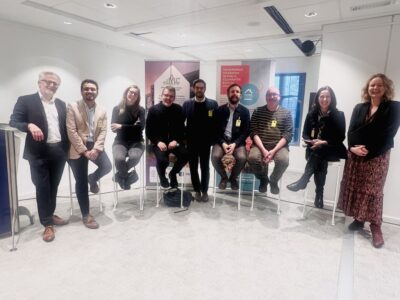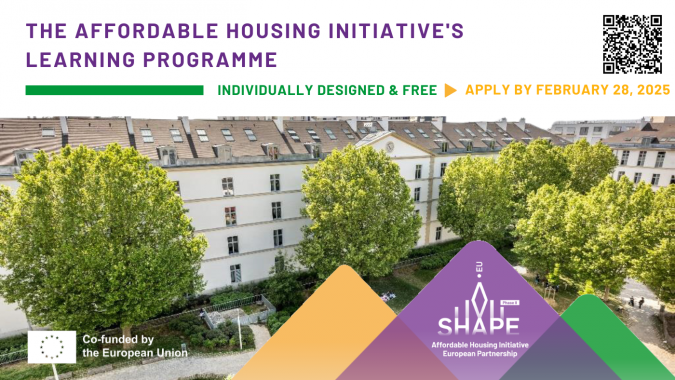The European Affordable Housing Initiative (AHI) has officially entered its second phase, aiming to accelerate the fair energy transition and address Europe’s housing crisis.
On December 5, during a networking lunch hosted by the European Economic and Social Committee at the European Commission, policymakers, social and affordable housing professionals, cities, and key housing actors gathered to mark this pivotal moment and open a new call for applications for a unique lighthouse district learning programme.
Led by Housing Europe in partnership with EBC, ECTP, Energy Cities, GNE Finance, SINTEF and co-funded by the European Union, the accelerator programme of the initiative seeks to revitalise communities by supporting local projects that tackle housing affordability and climate challenges.
Building on its 2022–2024 success—guiding 22 districts, developing renovation blueprints, and helping local actors to improve their renovation projects—the 2024–2026 phase is even more ambitious. With 35 Lighthouse Districts, hands-on workshops, study visits, and webinars, the initiative will deliver practical tools for energy-efficient, affordable housing.
Find out more on the official website.
“This programme represents a significant step forward in ensuring affordable, sustainable, and dignified housing across Europe,” the President of the EESC, Oliver Röpke, said, adding that we should use it as “a platform for partnerships and collective action.”
A crucial moment for social housing
The launch was just after the adoption of a crucial opinion by the European Economic and Social Committee (EESC) on social housing in the EU. The report underscores the urgency of addressing the housing crisis and lays the groundwork for transformative action.
MEP Marcos Ros Sempere also highlighted the EU’s role in fostering change: “The EU can invest, regulate, and encourage Member States to establish common rules for better housing. The time to act is now.” MEP Kim van Sparrentak emphasised the urgency of the initiative: “We should prioritise social housing districts as soon as possible. With the political momentum we have, we cannot miss this opportunity.” Amaryllis Verhoeven from the European Commission’s DG GROW emphasised the importance of building on successful practices while fostering innovation and partnerships. She highlighted the critical role of public, cooperative, and social housing providers within the social economy, stressing that private funding must be integrated into the solution as we work towards achieving our housing goals.

As the President of Housing Europe, Bent Madsen, put it, “Could you imagine this level of awareness and action on the housing crisis three or four years ago? Today, we are launching a programme that is not just about housing but about creating a fairer and more sustainable Europe.”
Speeding up learning: tailored training for housing innovators
In Phase II of the programme, the Affordable Housing Initiative is shifting gears by offering an individually designed training programme that is both tailored and free. The learning programme is meticulously crafted to upskill social and affordable housing providers, cities, and companie involved in planning or executing sustainable construction and renovation projects in affordable housing. Participants will develop integrated approaches that enhance the delivery of quality housing and mitigate the issues that have historically affected social and affordable housing developments.
Applications are open until 28 February 2025.
Selection will be based on an individual assessment by a jury, focusing exclusively on the applicants’ responses to ensure a tailored learning experience for each organisation and individual. With only 15 slots available in this first round, the programme promises to be highly personalised and impactful. The learning programme will start in March 2025.
The lessons we have already learnt
Champions of district renovation shared insights on challenges and successes during the event. Our member, Björn Berggren from Public Housing Sweden outlined that attention must be given to improving public procurement, local energy production, and circularity. Meanwhile, the European Builders Confederation emphasised the importance of demonstrating practical success to small construction companies and entrepreneurs, who often find it challenging to manage multiple roles simultaneously. “To convince a construction company that a certain approach is working, they need to see in practice how lighthouse districts have succeeded,” Fernando Sigchos from the European Builders Confederation explained.

Spread the news about the call with your peers and get in touch with our Junior Project and Innovation Officer, Margherita Marinelli for more information.
